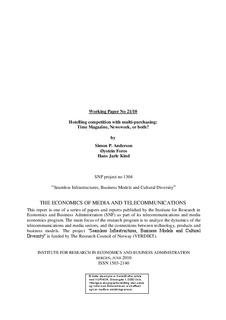| dc.contributor.author | Anderson, Simon P. | |
| dc.contributor.author | Foros, Øystein | |
| dc.contributor.author | Kind, Hans Jarle | |
| dc.date.accessioned | 2010-11-30T12:56:26Z | |
| dc.date.available | 2010-11-30T12:56:26Z | |
| dc.date.issued | 2010-06 | |
| dc.identifier.issn | 1503-2140 | |
| dc.identifier.uri | http://hdl.handle.net/11250/166318 | |
| dc.description.abstract | Equilibrium prices behave quite differently if consumers single-purchase (buy either Time Magazine or Newsweek) or if some consumers multi-purchase (buy both). Prices are strategic complements under single-purchase, and increase with magazine quality. In a multi-purchase regime prices are strategically independent because firms then act monopolistically by pricing the incremental benefit to marginal consumers. Furthermore, prices can decrease with magazine quality due to overlapping content. Higher preference heterogeneity increases prices and profits in equilibrium with single-purchase, but decreases them with multi-purchase. We determine when each regime holds, and present a detailed reaction function analysis which applies more generally to duopoly pricing. | en |
| dc.language.iso | eng | en |
| dc.publisher | SNF | en |
| dc.relation.ispartofseries | Working paper | en |
| dc.relation.ispartofseries | 2010:21 | en |
| dc.subject | magazine competition | en |
| dc.subject | multi-purchase | en |
| dc.subject | incremental pricing | en |
| dc.subject | content competition | en |
| dc.title | Hotelling competition with multi-purchasing : time magazine, newsweek, or both? | en |
| dc.type | Working paper | en |
| dc.subject.nsi | VDP::Samfunnsvitenskap: 200::Medievitenskap og journalistikk: 310 | en |
